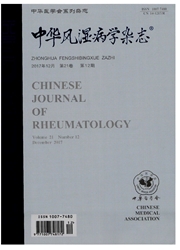

 中文摘要:
中文摘要:
目的初步探讨AS患者血清中IL-1家族细胞因子和IL-34水平的变化及作用。方法采用蛋白芯片技术检测6例AS患者、4名健康对照者血清中IL-1家族细胞因子的水平;采用ELISA方法检测65例AS患者和85名健康对照者血清中IL-34的水平,并分析血清IL-34水平与AS临床实验室指标的相关关系。统计学方法采用t检验,相关性分析采用Spearman相关分析。结果与健康对照组相比,As患者血清IL-1家族细胞因子中IL-1Ra[(3302±1352)pg/ml和(10778±2764)pg/ml]、IL-36Ra[(1363±194)pg/ml和(3875±996)pg/ml]水平显著下降(t值分别为5.363和4.289,均P〈0.05),IL-1α、IL-18、IL-36α、IL-37水平明显上升(t值分别为-2.532、-5.400、-5.023和-5.783,均P〈0.05);此外,AS患者IL-34水平显著高于健康对照组[(169±153)Dg/ml和(54±31)pg/ml,t=6.722,P〈0.01];并且患者血清IL-34水平与CRP、ESR呈正相关(t值分别为0.304和0.344,P均〈0.05);HLA-B27阳性组的IL-34水平明显高于HLA-B27阴性组(P〈0.05)。结论IL-1家族部分成员和IL-34作为重要的细胞因子,可能参与了AS的炎症和免疫反应。
 英文摘要:
英文摘要:
Objective To preliminarily investigate the levels of intedeukin (IL)-I family and IL-34 in serum of patients with ankylosing spondylitis (AS) and their roles. Methods Serum IL-1 family levels were detected from 6 AS patients and 4 healthy controls by using protein-chip technique. Enzyme-linked immunosorbent assay (ELISA) method was used to detect the levels of serum IL-34 from 65 AS patients and 85 healthy controls and the relationships of serum IL-34 levels and clinical or laboratory features were analyzed. T test and Spearman correlation were used for statistical analysis. Results IL-1Ra [(3 302±1 352) pg/ml vs (10 778±2 764) pg/ml]and IL-36Ra [(1 363±194) pg/ml vs (3 875±996) pg/ml] levels were significantly down-regulated in AS patients compared with that of healthy controls (t=5.363 and 4.289 respectively, both P〈0.05). The levels of IL-1α, IL-18, IL-36α and IL-37 were increased more remarkable in AS patients than in healthy controls (t=-2.532, -5.400, -5.023 and -5.783 respectively, both P〈0.05). Moreover, serum IL-34 levels were elevated more significantly in AS patients than in healthy controls [(169±153) pg/ml vs (54±31) pg/ml, t=6.722, P〈0.01] and were positively correlated with the levels of CRP and ESR. Serum IL-34 levels were markedly up-regulated in human leukocyte antigen (HLA)-B27 positive patients than in HLA-B27 negative patients (P〈0.05). Conclusion Part of IL-1 family and IL-34 may be involved in inflammatory or immunological process of AS.
 同期刊论文项目
同期刊论文项目
 同项目期刊论文
同项目期刊论文
 Umbilical cord mesenchymal stem cells inhibit the differentiation of circulating T follicular helper
Umbilical cord mesenchymal stem cells inhibit the differentiation of circulating T follicular helper Enhanced Apoptosis and Senescence of Bone-Marrow-Derived Mesenchymal Stem Cells in Patients with Sys
Enhanced Apoptosis and Senescence of Bone-Marrow-Derived Mesenchymal Stem Cells in Patients with Sys 期刊信息
期刊信息
